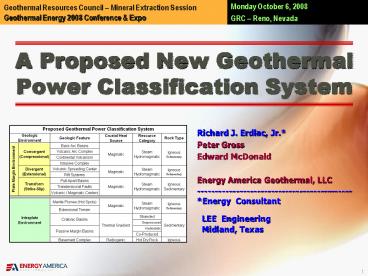A Proposed New Geothermal Power Classification System - PowerPoint PPT Presentation
1 / 20
Title:
A Proposed New Geothermal Power Classification System
Description:
Energy America Geothermal, LLC. Geothermal Resources Council ... Volcanic Plutonic. Modal Igneous Classification (Mineral Abundance) 5. Geopressured systems ... – PowerPoint PPT presentation
Number of Views:437
Avg rating:3.0/5.0
Title: A Proposed New Geothermal Power Classification System
1
A Proposed New Geothermal Power Classification
System
Geothermal Resources Council Mineral Extraction
Session Geothermal Energy 2008 Conference Expo
Monday October 6, 2008 GRC Reno, Nevada
Richard J. Erdlac, Jr. Peter Gross Edward
McDonald Energy America Geothermal, LLC
-------------------------------------------- Ener
gy Consultant LEE Engineering Midland,
Texas
2
Presentation Overview
- Multiple Classifications Geology Example
- Historic Geothermal Classifications
- New Classification Rationale
- Proposed Power Classification
- Five Categories
- Geologic Environment / Feature
- Plate Margin Environment 9 Features
- Intraplate Environment 5 Features
- Conclusions
3
Geology Classification Examples
Classification systematic arrangement in groups
or categories according to established criteria.
Multiple classification systems can be developed
to describe the same object or process.
Microscope thin section description.
Limestone Classifications
Hand specimen and in outcrop.
Particles Micrite Cement
Texture Grain Size
4
Geology Classification Examples
Color
Igneous Rock Field Classification
IUGS Classification Volcanic Plutonic
Modal Igneous Classification (Mineral Abundance)
5
Historic Geothermal Classifications
- CLASSIFICATION
- Low temp.
- (lt 90oC or 194o F)
- Moderate temp
- (90o-150o C or
- 194o- 302o F)
- High temp.
- (gt 150oC or 302o F)
- Geo-Heat Center
- Oregon Institute of Technology
6
Rationale For New Classification - One
Internal Discussion Geothermal from sedimentary
basins 1 Co-Produced natural flow or
pumped along with oil / gas 2
Stranded water behind pipe A)
lithostatic geopressured B)
hydrostatic
7
Rationale For New Classification Two
Heat Transfer
Heat Transfer
Resource Category
Geologic Environment
Geologic Environment
Heat Transfer Resource Category
Heat Transfer Resource Category
Heat Transfer
Geologic Environment
Terminology Mixing
Geologic Environment
Resource Category
Resource Category
Resource Category
8
Proposed Power Classification
Five Distinct Categories 1 Geologic
Environment A) Plate Margin B)
Intraplate 2 Geologic Feature 3 Crustal Heat
Source 4 Resource Category 5 Rock Type
Special Thanks to James Witcher For Technical
Discussions
9
Power Classification Plate Margin
Diagram adapted from James Madison University
10
Plate Margin Convergent (Compression)
Images from University of Michigan
Continent - Continent
Oceanic - Oceanic
Oceanic - Continental
Himalayas
Marianas Japan
Andes Cascades
Andesitic Dacite Rhyolite
Basaltic Andesitic
Andesitic Dacite Rhyolite
Rock type data from San Diego State
University Volcanology and Geothermal Energy
Table from Tulane University
11
Plate Margin Divergent (Extension)
Volcanic Spreading Center
Rift Systems
New Mexico?
Mid-Ocean Ridge
Image from University of Delaware
East African Rift
12
Plate Margin Transform (Strike-Slip)
Pull Apart Basin
Bartov Sagy, 2004, Geol. Mag. Hebrew University
of Jerusalem
Idealized Pull-Apart Basin
Transform
Crowell, 1984, AAPG Reprint Series No. 28
13
Plate Margin Transform (Strike-Slip)
Unruh, Humphrey, Barron, 2003, GSA
Transtension/Volcanic
Faulds, Henry, Hinz, 2005, GSA
14
Power Classification Intraplate Environment
15
Intraplate Mantle Plumes (Hot Spots)
Courtesy of USGS
Basaltic
Images from San Diego State University and Minnes
ota supercomputing lab.
16
Intraplate Extensional Terrain
Extensional Regions
Basaltic To Rhyolitic
Basin and Range
http//www.colorado.edu/GeolSci/Resources/WUSTecto
nics/CoreComplex/5700.html
Courtesy of USGS
17
Intraplate Cratonic Basins
Cratonic Basins
Wallace, 1982
Oil
Geopressured
Paleontological Research Institute
Permian Basin
USGS
Natural Gas
Geological Data Services 2004 Wolfcamp Structure
Map
18
Intraplate Passive Margin Basins
Passive Margin Basins
Transgressive Regressive Sequence
BEG Publications
USGS
19
Intraplate Basement Complex
Basement Complex
Costain et al., 1980 Virginia Tech
Cooper Basin Australia
20
Conclusions
Previous geothermal classifications have at times
attempted to be all encompassing regarding
geothermal energy application.
Previous geothermal classifications have often
mixed geologic, engineering, heat transfer
terminology.
The proposed geothermal power classification
systematically organizes characteristics or
criteria into five specific categories.
The proposed classification allows target sites
to be categorized by geology and should help in
exploration and economic planning of projects.























![[PPT] Combined Heat and Power Market to 2026 - Time to Understand the Industry Growth Rate PowerPoint PPT Presentation](https://s3.amazonaws.com/images.powershow.com/9683725.th0.jpg?_=20211115066)







